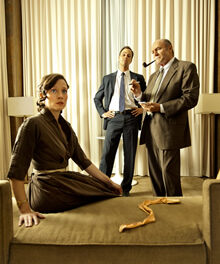Robert Moody, in the company of Leonard Bernstein’s older daughter, Jamie, led the Winston-Salem Symphony, Symphony Chorale, the Winston-Salem Children’s Choir and members of the UNCSA Cantata Singers in a challenging concert of her father’s works entitled “Lenny’s Spiritual Side.” The longest work on the program, filling the entire first half of the concert was Bernstein’s Third Symphony, Kaddish, narrated by Ms. Bernstein and sung by Amy Johnson, soprano.
Written in the 1960s in a style akin to the atonal modernism which abounded at the time, the Kaddish Symphony is not easy music to listen to and probably needs rehearing and study of the text to understand it well. Fortunately for the unsuspecting listener, Bernstein’s strong rhythmic sense and use of ostinato patterns (especially the hypnotic 7/8 [2 + 2 + 3] which is scattered throughout the symphony, and which builds a strong ending) creates an organizational or reference point. The first movement starts with many phrases which end abruptly, as though the composer were angry, and which recur again in the final movement. The frequent use of bells and bell-like sounds in the first movement recall portions of Stravinsky’s Les Noces(1923).
Ms. Bernstein has revised her father’s original text, which she summarized as “an argument with God,” to a more understandable “argument with my father,” citing the Talmudic practice of commenting on sacred texts and then commenting on the comments. The Kaddish, a sacred prayer for the remembrance of the dead, is sung by the choruses in Hebrew and Aramaic (an ancient Semitic language of the Middle East) and the narrator and soprano make comments and commentaries to and about God. Amy Johnson has a powerful warm voice with a beautifully controlled vibrato and was especially expressive in the lullaby she sings to God. The English translation was projected on a screen behind the orchestra, but was masked for most of the balcony by the suspended lighting equipment.
Maestro Moody, who glanced only occasionally at the score he obviously knew well, seemed to be constantly asking for more sound from the orchestra, especially from the smallish string section. Intonation problems crept into the orchestra with some of the wide intervals (double octaves, 13ths, etc.) and even some unisons in the violins. But the sotto voce string interlude was beautiful, as was all the chorus work, adults as well as children, and the long difficult a capella section in the last movement was stunning.
The two works in the second half, Chichester Psalms and the “Simple Song,” excerpted from Bernstein’s Mass, were played seamlessly without interruption. Written for strings, six brass, two harps, percussion and chorus, the Psalms are from a “kinder and gentler” Lenny. Starting with a dissonant choral chord (an instant reminder of another work of Stravinsky, his “Symphony of Psalms”) the first movement uses the fast 7/4 [2 + 2 + 3] to good effect. The hushed tones of muted brass in the second movement usher in the lovely voice of boy soprano Zachary Covington who sang with touching expression and accuracy. In the third movement, anguished string chords (minus the basses) poignantly set the scene for beautiful unison singing of the combined choruses and a gentle and soulful quartet of solo cellos. The work ends on a unison which, in this performance, allowed the “Simple Song” to start out of nowhere. Again Ms. Johnson was beautifully expressive as she sang, to the simple string accompaniment and lovely solo flute (Kathy Levy) high in the back balcony, “…for God is the simplest of all!”











